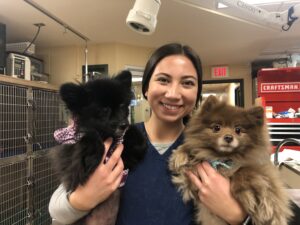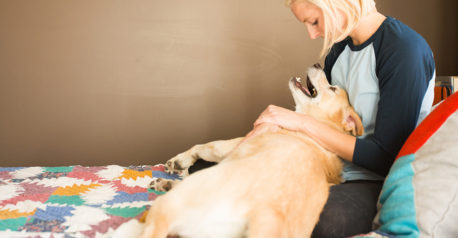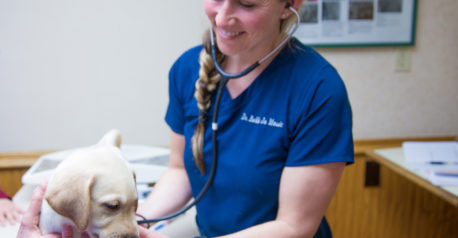Canine Unicompartmental Elbow (CUE) Dog Surgery
What is a canine unicompartmental elbow (CUE) surgery?
Canine unicompartmental elbow arthroplasty or CUE surgery is an advanced surgical approach that involves replacing the damaged joint surfaces of the inner (medial) portion of the elbow joint with metal and synthetic implants. This procedure was developed to address Medial Compartment Disease (MCD) in dogs. MCD is a consequence of elbow dysplasia in which the cartilage in the inner (medial) portion of the elbow joint wears away, and the underlying bone surfaces grind against each other.
One of the most common causes of forelimb lameness in dogs, elbow dysplasia is a syndrome encompassing four inherited developmental abnormalities that most commonly affects rapidly growing large breed puppies and young adults. Breeds at elevated risk of developing elbow dysplasia include German Shepherds, Golden Retrievers, Labrador Retrievers, Newfoundlands, Rottweilers, Mastiffs, Great Danes, Saint Bernards, Bernese Mountain Dogs, and Weimaraners. Typically both elbows are affected. These developmental abnormalities result in arthritis of the elbow joint as well as discrete pathological entities such as fractures within the joint.
How can Medial Compartment Disease (MCD) be treated in dogs?
Medial Compartment Disease (MCD) is the “end stage” form of elbow dysplasia where the inner (medial) portion of the joint deteriorates and leads to bone on bone grinding. Oral medications, joint injections, and physical rehab therapy may be beneficial in some MCD cases short term, and should be discussed with your veterinarian. When surgical treatment is considered necessary, as is often the case, the Canine Unicompartmental Elbow (CUE) is a safe and effective option to consider. The CUE was developed as a treatment for MCD in dogs in whom arthroscopic treatment or nonsurgical options have proven unsuccessful. The CUE implant provides relief of the pain caused by bone-on-bone grinding in this portion of the joint while preserving the dog’s own healthy cartilage in the lateral compartment.
Prior to CUE surgery, routine diagnostic tests will need to be completed for surgical planning and to ensure your canine companion is healthy enough to undergo surgery. This work-up typically includes bloodwork to evaluate your dog’s organ systems and x-rays of the affected limb. Sometimes, a CT scan may be necessary.
CUE Humeral Implant
What can I expect after my dog has CUE surgery?
Your dog will be released and sent home with antibiotics and pain-relieving medications. Your dog will have a bandage on their limb when they leave the hospital, which you will need to keep clean and dry. After one week, the bandage will be changed and usually will be removed two weeks after surgery when the stitches are taken out. Your dog must be strictly confined to a kennel or crate, with controlled low-impact activity only (such as short leash walks) for the first eight to twelve weeks after surgery. During this period, your veterinarian will instruct you on when and how to begin gradually increasing activity, and will coordinate a physical rehabilitation program to optimize their recovery.
Follow-up exams and x-rays will be performed at 4-6 and at 8-10 weeks after surgery to assess healing and physical rehabilitation progress. Further follow-up exams beyond this point will depend on the surgeon’s assessment of your dog’s progress. The goal for most patients is to be able to return to full activity by six months post-surgery.
Efficacy of Canine Unicompartmental Elbow (CUE) surgery in dogs
Canine unicompartmental elbow surgery is a very highly effective form of surgical treatment for mature dogs suffering from MCD. The implant provides new artificial joint surfaces where the cartilage has been worn away, relieving pain and improving limb use.

Let our highly trained and experienced team of veterinarians and veterinary technicians help you keep your pet as happy and healthy as they can be.
Call the Animal Clinic of Billings and Animal Surgery Clinic to schedule your pet’s next wellness examination with one of our veterinarians today!
406-252-9499 REQUEST AN APPOINTMENT



